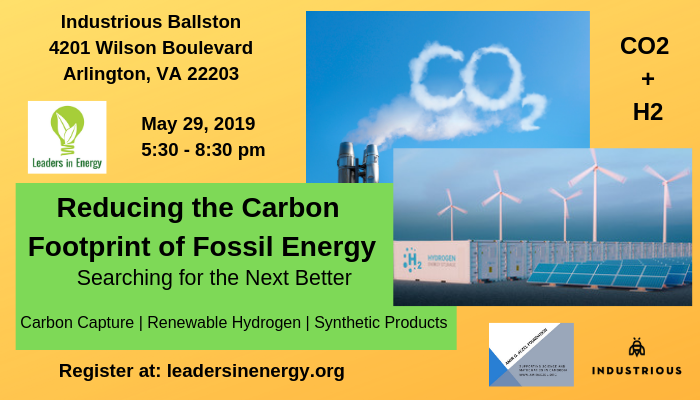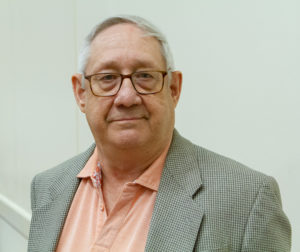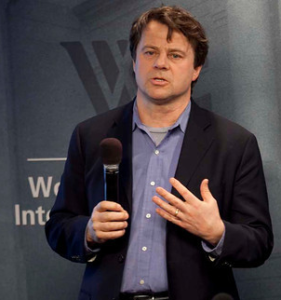Reducing the Carbon Footprint of Fossil Energy: Searching for the Next Better
 The United States is a major producer of petroleum including large quantities of natural gas. While this trend is good from an economic standpoint, concerns over climate change point to the need for emissions reductions from all possible sources—including fossil energy.
The United States is a major producer of petroleum including large quantities of natural gas. While this trend is good from an economic standpoint, concerns over climate change point to the need for emissions reductions from all possible sources—including fossil energy.
How can we reduce the carbon footprint of fossil energy through carbon capture and renewable hydrogen? Hydrogen and carbon are the building blocks of our hydrocarbon planet. Kicking the fossil carbon habit means developing technologies for a ‘new carbon economy’. Products of this new carbon economy can cover the full array of the things we use every day.
How can we accelerate this transition and what will this “next better” look like? This Program will discuss the technologies that can help reduce CO2 emissions from fossil energy including renewable hydrogen, carbon capture, and synthetic products. Specifically, the technology discussion will focus on advancements that:
1) Reduce greenhouse gas emissions
2) Capture and sequester, store, or utilize carbon dioxide
3) Produce useful products from waste streams
Speakers

Bill Brandon, President and CTO, Industrial Ecosystems Partners
BILL BRANDON is the Chief Technology and Research Officer and Vice President for Leaders in Energy (LE) and the President and CEO of Industrial Ecosystems Partners (IEP). He has focused on the role of renewable fuels to help reduce criteria pollutants, including aromatics, in addition to providing low carbon alternatives. He has published articles in Advanced Biofuels USA, Biofuels Digest, and the LE blog. His company, IEP, is developing new methods to convert wet organic waste utilization into energy for controlled environment agriculture.
Bill is an architect by training and his design/build firm has been engaged in substantial residential additions and renovations in the DC metro area. His designs have incorporated aspects of building energy efficiency including early adapter status of passive solar, super insulation, underground structures and ground source heat pumps. Bill holds a B. Arch degree from Miami University and completed advance course work in interdisciplinary studies at the University of Texas, Austin.

Lee Beck, Senior Advocacy & Communications Advisor
LEE BECK is the Global CCS Institute’s Senior Advisor for Advocacy and Communications based in the Institute’s Washington, DC office. The Institute is the world’s leading authority on carbon capture and storage (CCS) – an international climate change organization whose mission is to accelerate the deployment of CCS as an imperative technology in tackling climate change and providing energy security. In her role, Lee works closely with diverse stakeholders in North America to advocate on behalf of and strengthen the understanding of CCS and its role in delivering vital emissions reductions vis-à-vis global climate goals. Before joining the Institute in mid-2018, Lee was a Public Relations Project Manager at VEIC, a non-profit which addresses the economic and environmental costs of energy consumption through the adoption of energy efficiency and renewables. She began her career as a journalist reporting in Germany, Italy, Tanzania and Hong Kong before gathering experience in a variety of global energy issues such as natural gas markets, energy and climate diplomacy, and the German Energiewende.
Lee has a Master of Arts in International Affairs & Economics with majors in Energy, Resources & Environment and Political Economy from Johns Hopkins University’s School of Advanced International Studies (SAIS). Lee is also currently a Women Leaders in Energy Fellow at the Atlantic Council’s Global Energy Center. She speaks German, French and Italian.

Greg Kats, Blue Planet Board Member
GREG KATS serves on the Board of Blue Planet which uses its patented Liquid Condensed Phase (LCP™) Technology to convert CO2 into high-value CarbonMix™ building and highway materials. Greg is the President of Capital E – which works with governments, corporations and financial institutions to design, scale and implement clean energy and decarbonization. He is also the CEO of the Smart Surfaces Coalition accelerating city investment in low carbon resilience. He served as Managing Director of Good Energies, a several-billion-dollar global clean energy PE/VC fund. Greg also served for 5 years as the Director of Financing for Energy Efficiency and Renewable Energy at the US Department of Energy. He was the Founding Chairman of IPMVP and built it into the global energy and water efficiency design and verification standard for $50 billion in building upgrades. He is a founder of both the American Council on Renewable Energy (ACORE) and the country’s first green bank.
Greg is the author of Greening Our Built World; Costs Benefits and Strategies and regularly testifies before and advises governmental entities on energy efficiency and renewable energy, green cities and financing issues, including recently the US Congress, the World Bank, the Israeli Knesset, and the National Academy of Sciences. Greg earned an MBA from Stanford University and received the US Green Building Council’s Lifetime Achievement Award and the Lifetime Achievement Award from the Alliance to Save Energy. Greg has served on a dozen clean energy corporate boards, and solar PV powers his family home and electric car.
NOTE: An additional speaker has been invited from Lanza Tech, a company that is working to turn waste carbon from a liability to an opportunity through its patented, wholly-owned microbial processes.
Early bird discount available through Wednesday, May 22nd. Ticket includes program, pizza, and beverages. Job seeker and student pricing available.
Thanks to our sponsors — Amir D. Aczel Foundation for Research and Education in Science and Mathematics and Industrious Ballston.
Location:
Industrious Ballston
4201 Wilson Boulevard
Arlington, VA 22203

